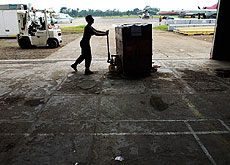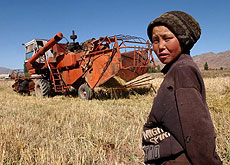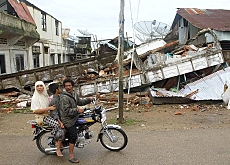Tsunami sharpens focus on disaster prevention

International cooperation is vital to reduce the risks and destruction associated with natural disasters, the Swiss Agency for Development and Cooperation says.
The SDC said that last December’s tsunami had shown the importance of early warning systems and action plans for events such as earthquakes and hurricanes.
Dealing with natural disasters was the theme of the SDC’s annual Humanitarian Aid Day, held in Bern on Friday and attended by almost 1,000 people.
The conference came just three months after a tidal wave caused by an undersea earthquake swept over parts of southeast Asia, leaving widespread destruction and almost 300,000 people dead or missing.
A further earthquake shook the region on Monday. Two days later three Swiss aid experts flew to the devastated Indonesian island of Nias where more than 500 people are thought to have died.
The SDC still has 23 experts in the region following the tsunami.
Focus
Toni Frisch, head of humanitarian aid at the SDC, told swissinfo that the tidal wave had prompted the agency to focus more on natural disasters this year.
“We wanted to show what Switzerland can do, not only in the emergency phase, but also in rehabilitation, reconstruction, prevention and preparedness,” he said.
Frisch said that Switzerland had long been involved in disaster prevention and preparedness – its efforts include sending rapid response and rescue teams straight after a disaster and then offering longer-term rehabilitation, such as rebuilding schools, hospitals and infrastructure.
He added that the quick reaction to the tsunami had confirmed that the Swiss were on the right track.
But he stressed the importance of prevention and, in particular, of pushing for early warning systems in high-risk areas.
Alert
“It is very important that people can be alerted locally, especially in remote areas,” said Frisch. “If there is no tsunami for ten or 15 years people will forget, so it is important that we are always paying sufficient attention to this question.”
The SDC is also currently involved in several readiness and prevention projects in other regions.
In Turkey, where the SDC says 90 per cent of the population is exposed to either first or second-degree earthquake risk, the agency has organised and financed programmes to train and equip local rescue teams.
The SDC also supports projects in Nicaragua and El Salvador to help analyse and manage the dangers associated with hurricanes.
The move came after Hurricane Mitch devastated Central America in 1998, causing great destruction and up to 20,000 deaths, many though landslides and floods.
Frisch said that the SDC planned to focus its natural disaster efforts even more in the future. This would involve being better prepared for the rapid response phase immediately after disasters and combining longer-term efforts with development aid.
In all, the SDC estimates that around 600,00 people have died and more than two billion others have been affected by natural disasters over the past ten years.
The economic effects are thought to run into billions of dollars in countries which the SDC says are already disadvantaged or vulnerable.
swissinfo, Isobel Leybold-Johnson
SDC budget 2005: SFr1.7 billion ($1.42 billion).
Humanitarian aid budget 2005: SFr277 million
Switzerland has allocated SFr29.5 million for tsunami aid and reconstruction.
SFr100,000 has been made available for the earthquake-hit Indonesian island of Nias.
The SDC says prevention can be stepped up by training and equipping local rescue teams and through scientific projects.
Other measures include improving civil and military cooperation on aid distribution and cash for shelter programmes, where families house the homeless.
SDC director Walter Fust has also suggested a text message warning system in at-risk areas.

In compliance with the JTI standards
More: SWI swissinfo.ch certified by the Journalism Trust Initiative



You can find an overview of ongoing debates with our journalists here. Please join us!
If you want to start a conversation about a topic raised in this article or want to report factual errors, email us at english@swissinfo.ch.